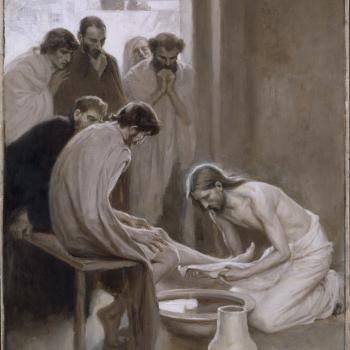
To join the conversation about Mercy in the City, or order a copy, go here.
Lent in the legislature is always a problem.
The Lenten season falls at a time of year when the legislative calendar is so full that I feel like I’m being drug by a runaway horse. There’s not much time for more than going to mass and snatches of hurried prayer that don’t connect up to anything resembling a coherent Lenten practice. It’s all about tired, over-stimulated hanging in there. Lent gets washed away in all this busyness.
Every stopover at mass is a sudden downshift to a slower rhythm. It is so different from the break-neck pace of the rest of the day that it jars more than soothes. Prayers at night and in the morning require an act of will; otherwise I’ll daydream through the words as I say them.
My Lent has thus been more a time of confusion than spiritual and moral clarity. In fact, there have been a number of years when I decided that doing the best I could on my job in the face of whatever came was my Lent.
Reading Mercy in the City inspired me to be more intentional about how I do Lent in the legislature. The book’s author, Kerry Weber, is a twenty-something who decided to give up the usual sweets for Lent and then added a resolution to perform each of the Corporal Works of Mercy during Lent, as well.
The Seven Corporal Works of Mercy are:
- Feed the hungry.
- Give drink to the thirsty.
- Clothe the naked.
- Shelter the homeless.
- Visit the sick.
- Visit the imprisoned.
- Bury the dead.
That’s a tall order for a twenty-something with a full-time job and a dating life, but she managed to get it done. Her journey through the seven Works of Mercy is an illuminating read. Miss Weber learned a lot about other people as she handed out food, spent the night at a homeless shelter and visited with prisoners at San Quentin. Instead of just going through the list of Works and checking them off, she made an effort to learn from the people themselves, to see their humanity and their individuality.
This can be difficult. I’ve never done anything like this for Lent, but I have done some of these things at other times in my life. I can tell you that the sick throw up on you, the hungry gripe about the food you serve them and prisoners often go back to their old ways once they are free.
And yet, there is nothing in Jesus’ words equating Himself with these people that gives us the freedom of turning away from them. If you have done it for the least of these, you have done it for me, He says to us. There isn’t any wiggle room in that statement for an out based on the exterior ugliness of the people you are trying to help. I imagine there were First Century four-flushers and manipulators just as there are today. But Our Lord didn’t say a word about refusing to help people because they can be jerks.
He tells us that whatever we do for them in His name will not be lost. And whenever we turn our backs on the hungry, thirsty, sick, homeless, or imprisoned among us, we will be held accountable as if we had turned our backs on Him.
That’s a heavy kind of instruction. It should weigh on our hearts, and not just during Lent. We will be judged by how we treat the “least of these.” All our Amen-saying is for nothing if we don’t help those who can’t help themselves. More to the point, each and every one of us began life as someone who could not help themselves, and if we live long enough, we will be people who can’t help ourselves again. That is the human condition.
The pitiless among us want to solve these problems by killing those who need help. Just pick up the needle or use the vacuum aspirator and be done with them. But Jesus tells us clearly and without equivocation that we are called to something more than that.
The same God Who authored all life, tells us to honor life by caring for one another, especially when it’s not easy and it costs us something.
Mercy in the City is a well-written, entertaining look at one young woman’s attempt to do the seven Corporal Works of Mercy for Lent. If you read it, it will give a lot to think about and may inspire you to do the same thing yourself, which makes it excellent Lenten reading.
















